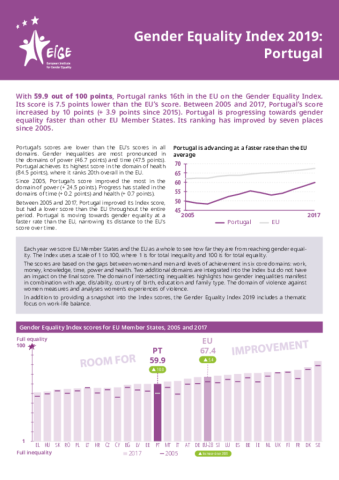With 59.9 out of 100 points, Portugal ranks 16th in the EU on the Gender Equality Index. Its score is 7.5 points lower than the EU’s score. Between 2005 and 2017, Portugal’s score increased by 10 points (+ 3.9 points since 2015). Portugal is progressing towards gender equality faster than other EU Member States. Its ranking has improved by seven places since 2005.
Portugal’s scores are lower than the EU’s scores in all domains. Gender inequalities are most pronounced in the domains of power (46.7 points) and time (47.5 points). Portugal achieves its highest score in the domain of health (84.5 points), where it ranks 20th overall in the EU. Since 2005, Portugal’s score improved the most in the domain of power (+ 24.5 points). Progress has stalled in the domains of time (+ 0.2 points) and health (+ 0.7 points).
Between 2005 and 2017, Portugal improved its Index score, but had a lower score than the EU throughout the entire period. Portugal is moving towards gender equality at a faster rate than the EU, narrowing its distance to the EU’s score over time.
Explore the Gender Equality Index 2019 on our website and find out the score for your country.
